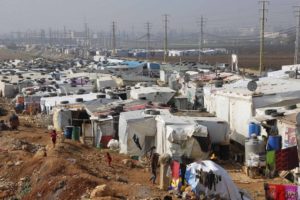Refugees forced into organ trade
An illegal trade in human organs is booming in Lebanon as desperate Syrian refugees resort to selling body parts to support themselves and their families, according to a BBC investigation.
Since the Syrian conflict erupted in 2011, at least 1.5 million people have poured into Lebanon, where they make up around a quarter of the country’s population.
Many have no legal right to work, and families are forced to find other ways to pay for food, shelter and healthcare.
According to a report published in June, some 70 percent of refugees in Lebanon are living below the poverty line.
The BBC report filmed a trafficker named ‘Jafaar’ who brokers deals from a coffee shop in Beirut.
“I exploit people, that’s what I do. I know what I’m doing is illegal but I’m helping people, that’s how I see it. Some of my clients would have died anyway,” Jafaar told the BBC.
“They usually ask for kidneys, yet I can still find and facilitate other organs,” he said.
 “They once asked for an eye, and I was able to acquire a client willing to sell his eye.”
“They once asked for an eye, and I was able to acquire a client willing to sell his eye.”
The Middle East is now a ‘hot spot’ in international organ trade, where the influx of refugees desperate to earn money is providing a new market for brokers, shifting focus from China and the Philippines, the report said.
Despite difficulties organs could be exported to buyers around the world, while sometimes refugees were being flown to nearby countries for surgery using fake papers, it said.
Jaafar told the BBC he drives blindfolded people who agreed to sell their organs to a hidden location on a designated day, where prior to surgery they undergo basic blood tests.
Sometimes the doctors operate in rented houses that are transformed into a temporary clinic.
“Once the operation is done I bring them back,” Jaafar said.
Last month Lebanon’s army ordered evictions that threaten the homes of 10,000 Syrian refugees in the Bekaa Valley, according to the United Nations refugee agency, UNHCR.
The UN agency said the Lebanese armed forces informed refugees living in informal settlements close to Rayak Air Base – a military airport in the Bekaa Valley – around the end of March that they would have to relocate due to security reasons.
“Many of the families have invested in their tents in the area. For some they have been living there for years now,” said Dana Sleiman, spokeswoman for UNHCR in Lebanon.
Refugees who fled the six-year-long conflict in neighbouring Syria make up a quarter of Lebanon’s population, and most live in severe poverty in makeshift camps across the country as the government opposes the creation of formal ones.
The fertile Bekaa Valley is home to more than 300,000 refugees living in flimsy tents often covered with plastic and canvas.
Laurie Nowell
AMES Australia Senior Journalist












